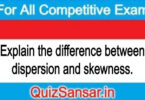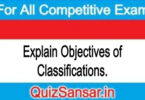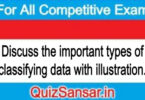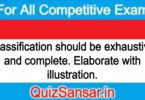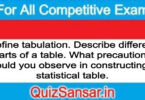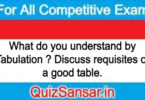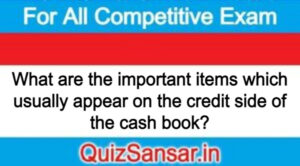
What are the important items which usually appear on the credit side of the cash book?
What are the important items which usually appear on the credit side of the cash book?
Ans.
Some of the important items which usually appear on the credit side of the cash book and the duties of an auditor thereto are given below:
1. Payments to Creditors
Money paid to creditors on open accounts can be vouched with the receipts issued by the creditors acknowledging the receipt of money. Money: due to them can be compared with the accounts of the creditors and the actual invoices received from the suppliers of the goods. The auditor should enquire whether periodical statements are submitted by the creditors and are compared with the creditors’ accounts. He may have to refer to minutes, contracts and other evidences before he passes an entry.
In regard to cash purchases, cash memos and Goods Inward Book should be compared with the entries in the cash book. Special attention should be paid to trade discounts which should be deducted from the purchases and only net amount should be carried to the books of account.
2. Wages
Another important entry, which is usually a big one, is that of wages. There are many chances of misappropriation of cash under this head. Before the auditor proceeds with his work, he should make a thorough investigation regarding the internal check system which is in operation. He should satisfy himself that the arrangement for the preparation of wages sheets and the system of payment is adequate so as not to leave any loophole for fraud. If he finds that there is any loophole, he must disown his liability.
3. Capital Expenditure
Capital expenditure means money spent on acquiring fixed assets. The duty of an auditor in this connection is to see that the payment is in order, that t is duly authorized and that the money spent has been properly capitalized. Such expenditure requires special attention.
4. Loans
He should examine the receipt given by the borrower and the loan agreement Pro-Note or Bill of Exchange. He should read carefully terms of loan regarding the rate of interest, the dates on which interest has to be paid and the date of repayment of the loan. He should make inquiry whether his client is authorized to advance loans. If the loan has been advanced against certain securities, he should examine those securities. If that loan. has been advanced against mortgage, he should examine the Mortgage Deed and the Title deeds etc.
5. Salaries
Salaries book should be examined. He should see that the total for the sales book for a particular month agrees with the cheques drawn for salaries of the item in the cash book under the cash column.
6. Agents and Traveller’s Commission
The agreement with travellers and the agents should be examined to the terms of ascertain the appointment regarding the rate of commission. Calculation should be made and the receipt given by the traveller or the agent should be examined and compared with the cash book.
The auditor should test the payment of commission by examining the orders received through the travellers.
7. Travelling Allowance
He should see the rules and regulations regarding the payment of travelling allowance. Calculations should be made. If there are no such rules, he should recommend to the management to frame such rules. He should examine the vouchers which should be countersigned by a responsible official. An extraordinary travelling expenses should be authorized by the Board of Directors. The directors are not allowed any travelling expense to attend the meeting of the Board of Directors unless the Articles of Association permit it. He should examine the Directors’s Attendance Register of the Minute Book whether the director attended the meeting. He should see that such expenses were incurred by the directors in the interest of the company.
8. Insurance of Premiums
In case of a new policy, the cover note or the receipt from the insurance company and the policy itself should be examined. In case of a renewal, the renewal receipt for the premium should be examined. A schedule of insurance policies, if their number is large, should be called for and examined. Such a schedule should give details of the polices, e.g., the number of the policy, the amount, the date of maturity, the amount of the premium payable, etc. If he finds that a policy has lapsed, he should enquire under whose authority it has been allowed to lapse.
9. Bills Payable
Returned bills duly cancelled should be examined. It would be a sufficient evidence of the amount having been paid. Reference may be made to the Bank Pass-Book and Bills Payable Books.
10. Bills Receivable Discounted and Dishonoured
Bills Receivable which have been discounted with the bank and which have been dishonoured can be vouched with the entry in the Bank Pass Book. The auditor should see that the account of the acceptor or the previous endorser is debited with the amount of the bill, noting charges and other expenses, if any.
11. Freight, Carriage and Custom Duties
The statements of account regarding the payment of freight and carriage, submitted by the shippers, clearing or forwarding agents, together with the receipts issued by them, should be examined to see that the payment. has been duly made and accounted for. He should see that allowances in respect of rebates have been brought into account.
12. Bank Charges
Bank charges such as commission, interest on overdraft and loan etc., should be examined with the Pass Book. He should check the calculation of interest.
13. Partner’s Drawings
Partnership Deed should be examined as to what is the maximum amount and the time for which a partner can draw money and whether he is to be charged any interest on drawings. He should vouch this entry with the Partner’s Drawing Book or Account and see that the signature of the partner is there against such entry.
14. Postage
The postage book should be compared with the Cash book or the Petty Cash Book and the balance of stamps in hand should be counted. Where a franking machine is in use the receipts issued by the post office for the payments made should be examined.
15. Petty Cash
There are greater chances of misappropriation of cash as there are no vouchers for a number of petty payments. He should, therefore, make an enquiry into the internal check system of petty cash payments.
16. Directors’ Fee
As a general rule the directors of a company. cannot claim any remuneration unless the articles expressly provide for it. In any case they are not entitled to get only monthly salary,
17. Miscellaneous expenses, such as rent, rates, taxes, advertising, lighting, etc.
He should examine the vouchers as usual and see that the expenditure is properly appropriated between the periods where necessary.
18. Bank Account
During the course of the year, cash or cheques are sent to the bank for deposit or collection and money is withdrawn from it frequently. Therefore such receipts and payments are to be vouched.
- What is meant by Database Management System?
- Discuss the advantages and drawbacks of database.
- What do you mean by database ? Discuss its Characteristics.
- What is Data Mining?
- What are the conditions of communication?
- What do you mean by business communication ?
- organization / Differentiate between classical and modern theory of organization
- What is forecasting

